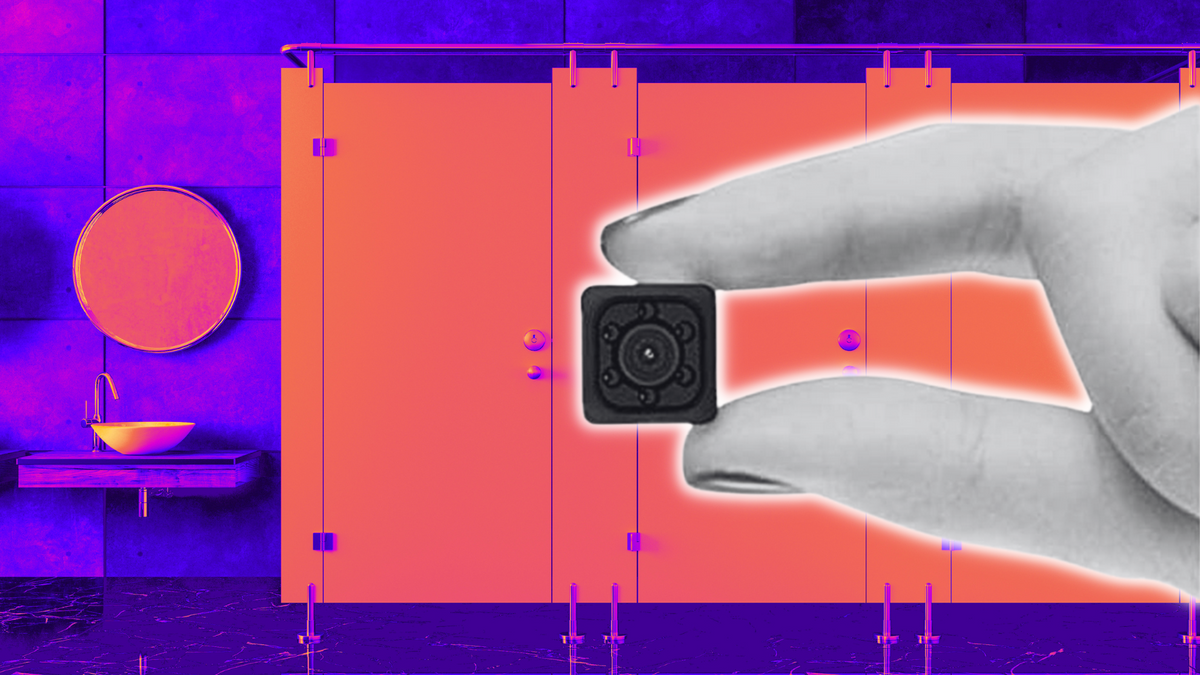Self-ID Would Make Epidemic of Voyeuristic Assault in East Asia More Gruesome
Singaporeans are dealing with an increase in voyeuristic assault; in Malaysia videos from a women’s changing room were being sold online; and Japan sees a huge surge in "upskirting" and spycam crime.

As digital sex crimes rise worldwide, South Korea has become the global epicenter of spy cams (also referred to there as “molka”) - the use of tiny, hidden cameras to secretly film people primarily in restrooms, hotels, and changing rooms. The bulk of the victims are female, the vast majority of the perpetrators are male, and the captured images or videos are regularly sold on various pornographic websites to great fanfare.
Disturbingly, spycam footage has actually become the dominant pornographic genre in South Korea. In 2018, the issue of spycams took center stage with the bust of multiple spycam rings, which included some well-known K-Pop stars. In fact, the problem was so severe at the time that the Seoul government established an 8,000-person team to scour the city’s public restrooms on a daily basis. To this day, the police still regularly sweep public restrooms and hotels. Tens of thousand women in the country took to the streets and protested against the harassment and violations they were facing daily and the government’s inability to take it seriously, but the problem remains, and enforcement of these offenses is arguably still inadequate. As bad as the problem is in South Korea, it is much worse when one takes into consideration that it is a vastly underreported crime; it is hard to detect the hidden cameras in the first place, so the victims and authorities may not even know when a crime occurs.
In Asia, the issue of high-tech voyeurism isn’t limited to South Korea. Singaporeans are dealing with an increase in voyeuristic assault; in Malaysia international headlines were made when videos from a women’s changing room were being sold online; and in Japan authorities are scrambling to deal with, but not discuss, a huge surge in "upskirting" and spycam crime. Upskirting is a term used to describe the act of taking photographs or video footage of a person's underwear or private parts without their consent, typically using a hidden camera or smartphone.
In recent years, the issue of hidden cameras and voyeurism, particularly in public restrooms and changing rooms, has been a growing concern in Taiwan. These hidden cameras, some as small as your fingernail, have been used to record and distribute images and videos of individuals, mainly women and girls, without their consent. On my daily inter-city train rides I now see warnings in stations in Taipei to be aware of the dangers of men taking upskirt photos on escalators, as well as reminders that staff regularly check restrooms for recording devices.
In 2020, a 26 year old man in Taipei made headlines after he was found to have secretly filmed more than 160 women and girls in Taipei and New Taipei City. Among his victims were girls as young as 13 and 14 years old. The majority of his spycams had been placed in women’s restrooms in various schools and universities in the city, sex-segregated facilities he had snuck into. The fact that he was able to sneak into so many women’s only restrooms is particularly alarming since Taiwan is considering passing a self-ID bill, which, if pushed through, will ensure that a man need only self-declare an inner sense of “gender identity” in order to legally change sex and enter female spaces. Men like this would have free and open access to women-only spaces, anywhere and at any time.
A couple from China vacationing in Taiwan discovered several hidden cameras placed in the bathroom and bedroom of their AirBnb in the south of Taiwan. The couple sued the owner of the AirBNB, and expressed concern about how many other people had been unwittingly victimized since the apartment was purchased and made available to holiday goers in 2014.
Last year, a man in southern Taiwan was caught with over 3,000 photos of women on his phone and computer, having taken "upskirt" photos of them using his cellphone and hidden cameras. And in 2021, in a high-tech related form of harassment, a 26-year-old Taiwanese YouTuber, who goes by the name Xiao Yu, was arrested for selling deep fake pornographic videos of various individuals well-known in Asia, ranging from influencers, to celebrities, and even government officials. It is estimated that he earned over $325,000USD from video sales.
So what is Taiwan doing to help solve this issue? In December of 2015, Taiwan passed the Sexual Assault Crime Prevention Act. The purpose of the act is to prevent sexual assault and to protect the rights of victims. This act provides sexual assault prevention education at every level of school, provides a legally competent authority to investigate sexual assault crimes, provides corrective measures and medical treatment to perpetrators within prison, and provides support for victims and punishments for offenders.
In direct response to voyeurism, including upskirting and hidden cameras, Taiwan has:
- Increased penalties for voyeurism and the distribution of voyeuristic material
- Increased funding for police investigations and technology to detect hidden cameras
- Established a national database of individuals convicted of voyeurism
- Increased public awareness campaigns to educate individuals on how to detect and report hidden cameras
In Taiwan the government has also established a national database of individuals convicted of voyeurism, which is maintained by the Ministry of Justice's Investigation Bureau. The purpose of this database is to keep track of individuals who have been convicted of voyeurism, and to make this information available to the public.
The database includes information such as the individual's name, date of birth, and photograph, as well as details about their conviction and sentence. The database is searchable by the public, and can be accessed through the Investigation Bureau's website. The government also has a mechanism to prevent re-offending through the use of this database. For example, employers can check the database before hiring a new employee, and individuals convicted of voyeurism are prohibited from working in certain fields, such as education and healthcare. The establishment of this database is part of the government's efforts to combat the problem of voyeurism in Taiwan and to protect the privacy and safety of its citizens. However, the effectiveness of this database in preventing re-offending, and the possible side effect of stigmatization of individuals that have served their sentence is still a topic of debate.
Additionally, there have also been grassroots efforts by citizens and civil society organizations to combat this problem, such as creating public maps of known locations where hidden cameras have been found and organizing volunteer groups to conduct searches and public awareness campaigns.
I was recently told by a friend on social media to look online at the proliferation of spycams being sold in Taiwan, and what I found was shocking. First, when I typed in “Taiwan spycam” to Google, nothing but pornography sites came up. The genre, it seems, is incredibly popular amongst consumers, which explains why so many victims of high-tech voyeurism find videos or images of themselves on porn sites available to a paying public, leading to emotional and psychological harm for the individuals recorded.
Advertised on popular shopping platforms like https://shopee.tw/, are easily hidden or disguised spy cameras. The advertisements also include photos of couples in bed together. The only logical implication being that one can film couples or a partner at their most vulnerable without consent.
Some have advocated a ban on the sale of hidden cameras in countries like Singapore. In other countries, laws have been passed to specifically prohibit the manufacture, sale, or possession of hidden cameras. For example, in South Korea, it is illegal to produce, distribute, or possess a device that can be used for voyeurism, such as a hidden camera, and violators can face up to three years in prison or a fine of up to 20 million won (about $18,000 USD).
The technologized version of male violence, namely digital sexual violence could get even more gruesome for females with new gender identity legislation. A precedent was set in 2021 when the Taipei High Administrative Court issued a ruling allowing a trans-identified male calling himself “Xiao E (小E)” to change his legal sex to female without sex reassignment surgery — the first of its kind. Until then, individuals could not change their sex on an ID card unless they provided medical certificates confirming a diagnosis of gender dysphoria and proof of ‘sex reassignment’ surgery. There is now a push in the country for self-ID, a simple self declaration of innate feeling and one would be allowed to legally change their sex. Studies show that globally, most males who identify as transgender retain their genitalia. Changing the law in order to allow these males access to women’s spaces means any man at all can access women’s spaces, essentially making all spaces mixed-sex spaces, to the detriment of females.
At a Taiwan public hot spring in 2018, a facility separated into male and female spaces so participants can bathe comfortably in the nude, a man disguising himself as a woman attempted to enter the female-only space. Scaring customers, who were exposed to his penis, he asked to be referred to as female before being escorted out. The same thing happened last year, with a man claiming to be a self-declared woman trying to access the women-only section of a hot spring facility with a false ID and his genitals tucked between his legs. He was promptly arrested.
The risk to the privacy and safety of women and girls is real. Around the world, there have been numerous cases in recent years of men either cross-dressing or claiming to be transgender in order to access women’s bathrooms and locker rooms for inappropriate purposes. Many women fear that predatory men, who often already go to great lengths to gain access to vulnerable women and girls, would abuse the notion of gender self-identity and take advantage of self-ID. The fact is, they already are.
Only when we know about the violence women and girls face are we able to make a difference. Help us expose male violence by becoming a monthly donor! The generous support of our readers helps to pay our all-female staff and writers.
Enter your email below to sign in or become a 4W member and join the conversation.
(Already did this? Try refreshing the page!)





Comments